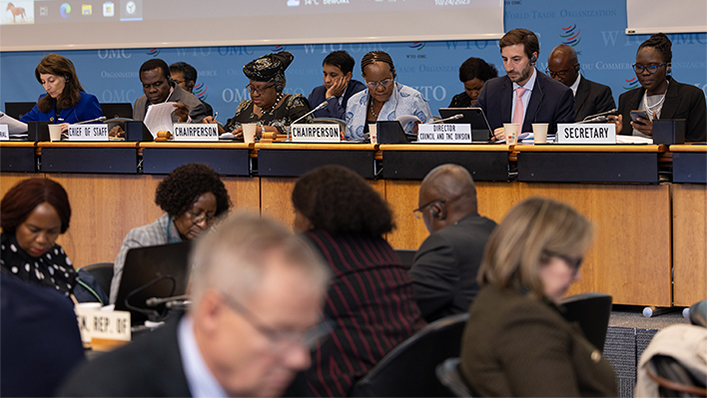
The chairs of the meeting — Director-General Ngozi Okonjo-Iweala and the General Council Chair, Ambassador Athaliah Lesiba Molokomme of Botswana — welcomed the positive engagement and constructive dialogue amongst the senior officials on the array of issues on the MC13 agenda as well as on emerging trade-related issues.
Summing up the discussions in her concluding remarks to the senior officials, the Director-General said she had a “very strong positive impression” regarding the exchanges which took place over the past two days.
The Director-General said it was clear that negotiators in Geneva now have the political mandate to try and achieve breakthroughs at MC13 on issues such as agriculture and food security, dispute settlement reform, the e-commerce work programme and moratorium, the “second wave” of fisheries subsidies negotiations, and development issues, among others.
“We’re living in very uncertain times,” the Director-General told the senior officials. “What makes me happy is the thought that perhaps, with the little bit that one can do from one’s corner, that we’re trying to make the world a little bit of a better place.”
The Chair of the General Council noted that the Senior Officials Meeting was the fourth station in preparations for MC13. The next stations will be a General Council meeting in early November, and the end of year meetings of the General Council and the Trade Negotiations Committee.
“We hope that, by that time, we can flesh out the matters that have been endorsed and on which political guidance has been received,” Ambassador Molokomme said. “So, as you go back to capital and brief your ministers, I hope that our Senior Officials Meeting illustrated the urgent need for capital engagement at all levels — to ensure success at MC13 and beyond. We all know what is at stake.”
The chairs’ summary of the Senior Officials Meeting can be found here.
The Senior Officials Meeting served as an important milestone in the preparations for the WTO’s 13th Ministerial Conference (MC13), to be held in Abu Dhabi, United Arab Emirates, from 26 to 29 February 2024.
The aim of the meeting was to take stock of progress on issues on the negotiating agenda, take decisions as appropriate, and solve specific problems. Participants also sought to point the way to possible deliverables for MC13, provide political guidance and support for the ministerial preparations, and deliberate on pressing global issues.
At the start of the Senior Officials Meeting, WTO members, in a special General Council meeting, adopted a decision to assist least-developed countries (LDCs) on the path to graduation from LDC status.
“With this decision, the WTO is sending a strong political signal that we can deliver for our most vulnerable members and help them achieve their development objectives,” the Director-General said shortly after the decision was adopted.
During the two-day meeting, senior officials had the opportunity to engage with each other on WTO members’ priority areas in various configurations, including plenary meetings of the full membership, breakout sessions on specific issues, bilateral talks, group coordination meetings, and consultations with the chairs or facilitators of negotiations.
The breakout sessions on the first day, where members split into three groups to enable interactive conversations, focused on the issues of agriculture, including food security; trade and development; the “second wave” of the fisheries subsidies negotiations; and dispute settlement reform.
On the second day, the breakout sessions took place in two groups and focused on the issues of trade and industrial policy, and trade and environmental sustainability.
The plenary meetings included an opening “scene-setting” session, reports from the breakout group facilitators at the end of day one, a session on other areas of work in view of MC13 preparations (including the issues of WTO reform, the e-commerce work programme and moratorium, the 12th Ministerial Conference Decision on the TRIPS Agreement, and others), and a closing session on the way forward, including a concluding summary from the General Council Chair and the Director-General.
Ambassador Molokomme called on senior officials to remain engaged, keep in touch with counterparts and continue to provide impetus to ongoing processes in Geneva.
“This will help crystallize the outcomes and matters to be put forward to ministers at MC13,” she said. “I hope you will build on the strong foundation established today so that — together — we can ensure productive ministerial engagement at MC13 in Abu Dhabi,” she added.
The GC Chair also stressed that delegations in Geneva have been putting a lot of effort into improving the daily functioning of WTO bodies through the so-called “reform by doing” process. She invited senior officials to commend the hard work of Geneva delegates and to continue to reform by doing for the benefit of the membership.
At the opening plenary on 23 October, the Director-General noted that the Senior Officials Meeting was taking place at a time of heightened global crises and she outlined the challenges ahead for members as they prepare for MC13.
“Excellencies, the world feels so fragile right now,” the Director-General said. “Every day seems to bring a new source of uncertainty — and a new threat to the lives and livelihoods of people everywhere. All of this weighs on global output and trade.”
“The world is looking to the WTO and other multilateral institutions to show that we can contribute to solutions and bring a bit of certainty in a sea of uncertainty,” she continued. “That is why at MC13 we need to show the world some solid deliverables on all fronts: fisheries and sustainability; agriculture and food security; development; e-commerce moratorium; services and digital trade; investment; and above all on WTO reform, particularly on reforming our dispute settlement system.”
Share
Reach us to explore global export and import deals